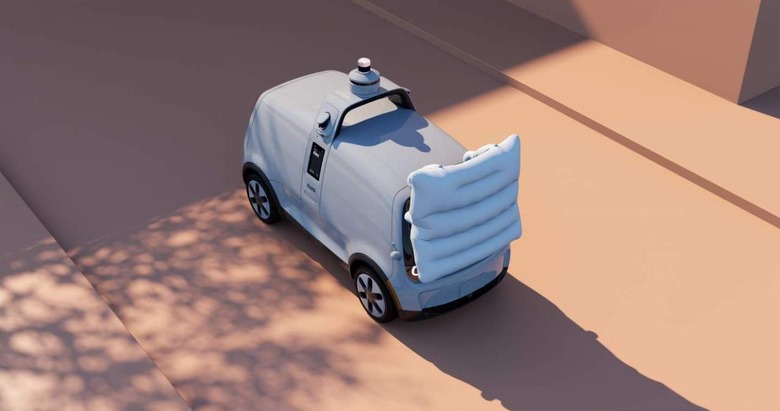Nuro's New Autonomous Vehicle Has A Safety Feature You Wouldn't Expect
Nuro, the car company known for creating autonomous delivery vehicles, has established itself as a budding industry leader in autonomous deliveries (via Reuters). The company develops driverless cars for businesses that need to deliver goods to customers and that want to do so in a sustainable and efficient manner. Nuro's autonomous electric vehicles are currently used by major brands including Kroger, 7-Eleven, and FedEx, among others.
On January 12, Nuro announced the coming development of its third-generation autonomous delivery vehicle. The vehicle will have twice the cargo room as its second-generation model while producing zero emissions in transport. Production of this new vehicle will take place at Nuro's facility in southern Nevada, the company noted.
Already the industry standard-bearer of autonomous delivery, Nuro's stated goal, per the press release, is to use its latest model as a tool to scale across the U.S. Nuro's new model will be produced in a zero-emissions warehouse, with all charging powered by renewable energy.
Nuro's latest autonomous EV adds an external airbag
Due to Nuro's mission of creating vehicles to courier goods rather than people, it has taken one of the most common automotive safety features and flipped it inside out – literally. According to the company, the third-generation Nuro cars will feature an external airbag to boost safety for others on and around the road – namely pedestrians, cyclists, and other cars.
This airbag will deploy in the instance of near-contact and is accompanied by what the company describes as a "multi-model sensing suite," complete with visual, lidar, and thermal cameras designed to create a 360-degree view surrounding the vehicle at all times.
This new safety tool is especially promising given the rough history of autonomous vehicles on American roadways. Companies including Google and Apple have struggled to develop and implement safe autonomous vehicles. In 2020, Uber sold its self-driving division after struggling to scale and implement it safely (via Wall Street Journal).

